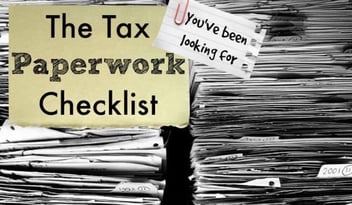The IRS just started processing tax returns this week, and tax preparers throughout the country are hustling and bustling to find all kinds of savings for their clients... as well as chewing at the bit to help them with this year's taxes. The buzz around the tax reform package is that there are still legal and ethical "loopholes" that might save taxpayers a lot of money. It's very important for business owners. Which implies that if you've ever wanted to start your own business, 2018 could be the year to do it - even if it's only as a side hustle.
Now, when it comes to tax returns, I'm frequently asked, warily and perhaps anxiously, "Um, what happens if I haven't filed a tax return in a couple years?"
Even when you're talking to someone in your camp, like me, it's a difficult question to ask, and it takes a lot of guts to do so.
I've got some horrible news for you, but I also have some wonderful news. Continue reading...
Sara F Gonzalez's Unfiled Tax Returns: Seven Negative Results And Six Painful Consequences
“Three Rules of Work: Out of clutter find simplicity; From discord find harmony; In the middle of difficulty lies opportunity.” -Albert Einstein
Unfortunately, even if you don't owe any taxes that year, failing to file a tax return can result in complications. That is, of course, the situation if you owe money in taxes. Not only may the federal government cause you problems, but each state has its own set of rules, and states occasionally have powers that go beyond those of the federal government.
So far, I've mentioned both bad and pleasant news. Let's begin with the negative news.
Here are some of the negative repercussions of unfiled returns, starting with the lighter side - if you don't owe any taxes...
1. You Didn't Get Your Tax Refund
Simply put, if you are due a refund but do not file, you will not receive it. This is true for both the federal government and most states that have an income tax. You have three years to file your federal return, after which you will no longer be eligible for a refund.
2. Charlotte Business Owners: Don't Let Losses Build Up
The IRS permits you to carry forward losses from your business or investments to offset revenues in future years. You can't roll losses forward if you don't submit a return in the year the loss arises.
3. Refundable Tax Credits Can Be Missed
If you qualify for a tax credit, such as the Earned Income Tax Credit (EITC), you must file a return in order to get it. This is a refundable credit that puts money in your pocket and is still available under the new tax reform framework. You will lose the tax credit if you do not file.
4. The Internal Revenue Service (IRS) Might File A Return On Your Behalf – Without You
When you fail to file a tax return, the IRS may fill out a substitute federal return (SFR) on your behalf. This return includes data from W2s, 1099s, and other documents sent to the IRS by your employer, bank, or other businesses. The SFR typically has just one exemption, no dependents, and the standard deduction.
An IRS-prepared SFR will indicate a higher tax liability than if you filed yourself if you qualify for more than one exemption, have dependents, or itemise instead of taking the standard deduction. You might not have filed because you thought you didn't owe any taxes... However, under the SFR that the IRS files on your behalf, you DO owe tax, and some of the more serious repercussions that I'll discuss below begin to take effect.
5. The Audit Time Clock Doesn't Work
The IRS has three years to audit your tax return after you file it. The statute of limitations kicks in after that, and the agency can no longer audit the return. If the IRS prepares an SFR for you, it is subject to audit at any moment. If you file, you will avoid the SFR. The IRS normally completes the SFR a few years after the due date.
6. It's possible that you won't be able to include taxes in your bankruptcy.
You must be current on your tax filing requirements to qualify for both Chapter 7 and Chapter 13 bankruptcy. In most circumstances, you must have submitted Chapter 7 taxes for the previous two years and Chapter 13 returns for the previous four years.
7. Having a Hard Time Getting a Loan
Loans are far more difficult to obtain if you do not file a tax return. Financial institutions will typically request copies of filed tax returns when you apply for a mortgage, personal loan, business loan, or loan for higher education.
Here's what can happen if you don't file your tax return and owe money...
1. Additional Penalties
If you owe taxes and fail to file your Federal tax return by the due date, you will be subject to a particular "failure-to-file" penalty. For each month you don't file, you'll be charged 5% of the balance. The "good" news is that this penalty is capped at 25%. The lesser of $205 or 100% of your tax payable is the minimum penalty if you file at least 60 days late.
2. The Possibility of Imprisonment
Although jail time is uncommon, it is possible. For failing to file your return, you might risk a year in prison and a fine of up to $25,000 under federal law. If you conduct fraud, the sanctions are significantly worse. You can't go to jail only for not paying your taxes, thankfully. In most cases, jail term is imposed for failure to file or for evading taxes on intent.
3. Tax Liens that are Publicly Posted
When the IRS files a public document called a "Notice of a Public Tax Lien," it is known as a "Notice of a Public Tax Lien." As a result, your tax debt appears on your credit record. This has a negative influence on your credit and puts you in the crosshairs of a variety of unscrupulous marketers.
4. Wage Suspension
When the IRS contacts your employer to have wages withdrawn from your paycheck to pay an IRS tax debt, this is known as IRS wage garnishment.
5. Levy on Banks
The IRS has the authority to levy your bank account by contacting financial institutions or banks with which you do business.
6. The Timer for Collection Never Starts
If you owe money on your tax return, the IRS has 10 years to recover it. The statute of limitations kicks in after that, and the agency is no longer able to collect on that return. If you don't submit a tax return, though, the 10-year period does not begin There are a couple more possibilities, but I'll spare you the more unpleasant ones.
To be honest, you're reading this, so it's time for some good news.
In a nutshell, you have Kohari & Gonzalez PLLC on your side. IN OUR GAME, THERE IS NO SHAME. This means you can share your sorrows and faults with us, and there will be no judgement.
Even better, with a little experienced assistance in your corner, we can help you avoid ALL of these penalties.
Please contact me by phone or email right away., and you could end up owing taxes from 15 years ago!
Warmly,
Sara F Gonzalez
(704) 599-3355
Kohari & Gonzalez PLLC



